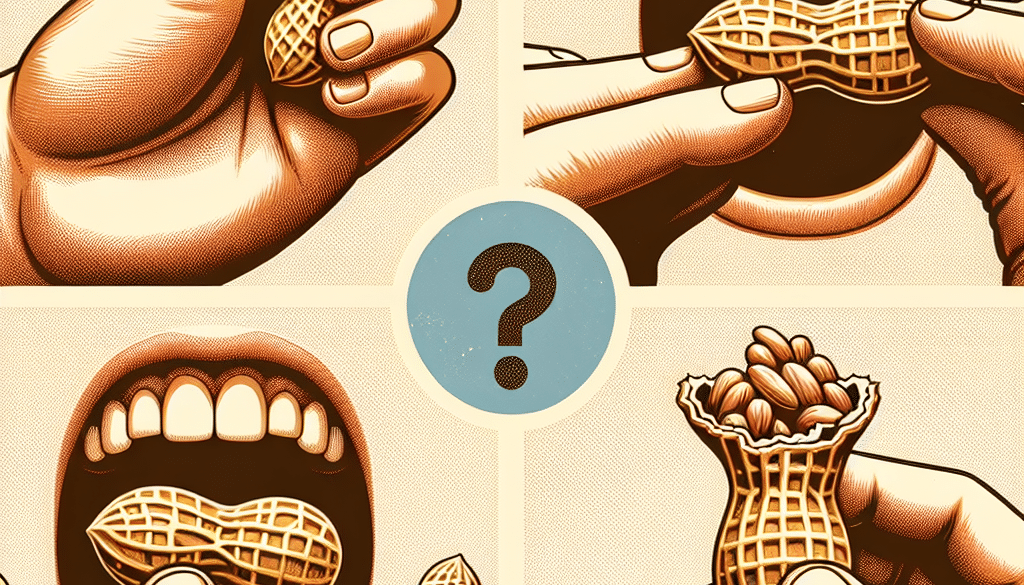Is It OK to Eat the Shell of a Peanut: Crunching on Controversy
-
Table of Contents
- Eating Peanut Shells: Nutritional Benefits vs. Health Risks
- Understanding Peanut Shells: Composition and Nutritional Profile
- Chewing on Controversy: Is It Safe to Eat Peanut Shells?
- Health Risks and Considerations
- Cultural Practices and Anecdotal Evidence
- Case Studies and Research
- Conclusion: To Eat or Not to Eat Peanut Shells
- Enhance Your Diet with ETprotein’s High-Quality Protein Products
Eating Peanut Shells: Nutritional Benefits vs. Health Risks

When it comes to snacking on peanuts, a common question that arises is whether it’s safe or even beneficial to eat the shell. While some might discard the shell without a second thought, others may consider munching on the crunchy exterior for added fiber or simply for the novelty. This article delves into the controversy surrounding the consumption of peanut shells, examining the nutritional benefits, potential health risks, and cultural practices that influence this unconventional eating habit.
Understanding Peanut Shells: Composition and Nutritional Profile
Peanut shells, the fibrous outer covering of the peanut, are composed primarily of cellulose, lignin, and hemicellulose—components that contribute to their tough and fibrous nature. While not typically considered part of a standard diet, peanut shells do contain some nutritional elements:
- Fiber: Peanut shells are high in dietary fiber, which is essential for digestive health.
- Antioxidants: They contain compounds such as polyphenols, which have antioxidant properties.
- Minerals: Traces of minerals like potassium and magnesium can be found in the shells.
Despite these components, the nutritional benefits of peanut shells must be weighed against their digestibility and potential health implications.
Chewing on Controversy: Is It Safe to Eat Peanut Shells?
The primary concern with eating peanut shells is their indigestibility. Humans lack the necessary enzymes to break down cellulose and lignin effectively, which means that consuming large amounts of peanut shells can lead to digestive issues such as:
- Intestinal blockages
- Gastrointestinal discomfort
- Constipation
Moreover, peanut shells can be abrasive and may cause micro-tears in the digestive tract, leading to further complications. The risk of choking is also a concern, especially for children and the elderly.
Health Risks and Considerations
Beyond the physical risks, there are other health considerations to take into account:
- Pesticides and Contaminants: Peanut shells may harbor pesticides and other agricultural chemicals used during cultivation. These substances can pose health risks if ingested.
- Aflatoxins: Peanuts are susceptible to contamination by aflatoxins, toxic compounds produced by certain molds. While the peanut itself can be tested and treated for these toxins, the shells are not typically processed for consumption and may contain higher levels.
- Allergies: For individuals with peanut allergies, even the shells can trigger allergic reactions.
Cultural Practices and Anecdotal Evidence
In some cultures, eating peanut shells is not entirely unheard of. For example, in parts of China and Africa, boiled peanuts are consumed whole, shell and all. Anecdotal evidence suggests that in these cases, the boiling process may soften the shells, making them easier to chew and digest. However, there is limited scientific research to support the safety and nutritional value of this practice.
Case Studies and Research
Scientific studies on the consumption of peanut shells are scarce. However, research on dietary fiber and cellulose suggests that while moderate amounts of fiber are beneficial for health, excessive intake of indigestible fiber can lead to the aforementioned digestive issues. Case studies of intestinal blockages often point to the consumption of high-fiber, indigestible materials as a contributing factor.
Conclusion: To Eat or Not to Eat Peanut Shells
In conclusion, while peanut shells do contain some nutritional elements, the risks associated with eating them outweigh the potential benefits. The indigestibility, potential for contaminants, and health risks present significant concerns. It is generally advisable to enjoy peanuts without their shells and seek dietary fiber from safer, more digestible sources.
The key takeaways from this article are:
- Peanut shells are high in fiber but are largely indigestible for humans.
- Consuming peanut shells can lead to digestive issues and other health risks.
- Cultural practices that include eating peanut shells often involve processes that may reduce some risks, but scientific evidence is lacking.
- It is safer to consume peanuts without their shells and obtain dietary fiber from other foods.
Enhance Your Diet with ETprotein’s High-Quality Protein Products
If you’re looking to boost your protein intake with safe and nutritious options, consider ETprotein’s range of organic bulk vegan protein and plant proteins. Their products, including Organic rice protein, clear rice protein, pea protein, clear pea protein, pumpkin seed protein, sunflower seed protein, mung bean protein, and peanut protein, are non-GMO and allergen-free, making them an excellent addition to any diet.
ETprotein caters to a diverse range of industries and is trusted by leading global food and beverage brands. Whether you’re involved in sports nutrition, weight management, dietary supplements, or health and wellness products, ETprotein offers comprehensive solutions to meet all your protein needs.
About ETprotein:
ETprotein, a reputable protein Chinese factory manufacturer and supplier, is renowned for producing, stocking, exporting, and delivering the highest quality organic bulk vegan protein and plant proteins. They include Organic rice protein, clear rice protein, pea protein, clear pea protein, pumpkin seed protein, sunflower seed protein, mung bean protein, peanut protein etc. Their offerings, characterized by a neutral taste, non-GMO, allergen-free attributes, cater to a diverse range of industries. They serve nutraceutical, pharmaceutical, cosmeceutical, veterinary, as well as food and beverage finished product distributors, traders, and manufacturers across Europe, USA, Canada, Australia, Thailand, Japan, Korea, Brazil, and Chile, among others.
ETprotein specialization includes exporting and delivering tailor-made protein powder and finished nutritional supplements. Their extensive product range covers sectors like Food and Beverage, Sports Nutrition, Weight Management, Dietary Supplements, Health and Wellness Products, and Infant Formula, ensuring comprehensive solutions to meet all your protein needs.
As a trusted company by leading global food and beverage brands and Fortune 500 companies, ETprotein reinforces China’s reputation in the global arena. For more information or to sample their products, please contact them and email sales(at)ETprotein.com today.












